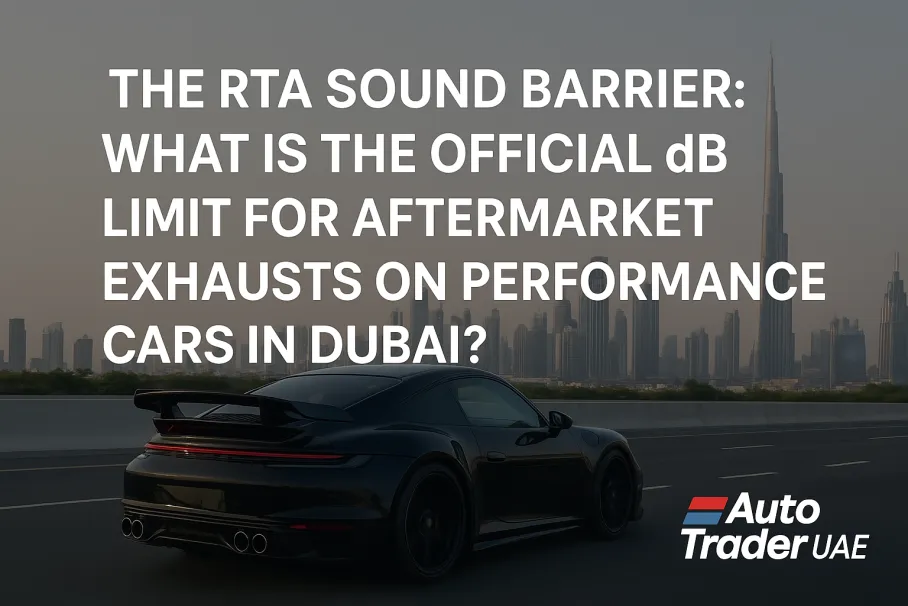The RTA Sound Barrier: What is the Official dB Limit for Aftermarket Exhausts on Performance Cars in Dubai?
Dubai’s car culture is loud — literally. Between the deep growl of V8 Mustangs and the sharp crackles of tuned Supras, the city’s streets often echo with the passion of automotive enthusiasts.
But as exhilarating as a roaring exhaust can be, Dubai’s Roads and Transport Authority (RTA) has strict rules about just how loud your car can legally get.
So, what’s the actual decibel (dB) limit for modified exhausts? And how do you stay street-legal without sacrificing that thrilling sound? Let’s break it down.
Understanding the RTA Exhaust Noise Regulation
The RTA doesn’t ban aftermarket exhausts — it regulates them. The goal is simple: balance between performance expression and public safety.
According to RTA Vehicle Modification Guidelines, any vehicle on public roads in Dubai must comply with Federal Traffic Law No. (21) of 1995, which limits the maximum sound level produced by the exhaust system.
Official RTA Limit:
For passenger vehicles and sports cars, the noise limit is 95 decibels (dB) when measured at a distance of 0.5 meters from the tailpipe at half of the engine’s maximum revolutions.
If your exhaust system exceeds this, your car will fail inspection and could be fined or impounded.
How the Sound Test Works
During a sound test, RTA-approved inspectors or police officers use a sound level meter to measure noise while the engine is running at specific RPM levels.
Here’s what they check:
- Engine revs to about 50% of redline
- Microphone placed 0.5m from exhaust outlet
- Measurement taken at 45° angle
- Background noise must be below 10dB
If readings are above 95 dB, the car will not pass roadworthy certification.
Fines for Loud Exhausts in Dubai
In Dubai, installing or using a non-approved or excessively loud exhaust can result in serious penalties under Article 20 of the traffic code.
Fine: AED 2,000
Black Points: 12
Vehicle Impoundment: up to 30 days
In 2024, Dubai Police recorded several cases of supercars being seized for “public disturbance” due to exhaust noise exceeding 100 dB — especially during late-night drives in JBR, City Walk, and Meydan.
Approved Aftermarket Exhausts: What’s Legal
Not all modified exhausts are banned — some are RTA-approved if they meet emissions and noise standards.
Legal if:
- Certified by the manufacturer for GCC markets
- Installed by a licensed modification workshop
- Passes the official RTA sound test (below 95 dB)
Illegal if:
- Straight-pipe or cat-delete systems
- Lacks mufflers or sound dampers
- Installed by unlicensed garages
RTA also requires that exhaust modifications do not affect emissions or vehicle safety systems.
Where to Get Approval for Modified Exhausts
Before upgrading your exhaust system, visit an RTA-approved modification center or Tasjeel inspection facility for evaluation.
You’ll need:
- Vehicle registration
- Emirates ID
- Workshop modification report
- Sound test certificate (if applicable)
Once approved, the modification will be added to your vehicle registration record, ensuring it’s officially recognized.
Performance Cars Commonly Tested for Noise
Some models frequently tested or flagged for exceeding sound limits include:
Even stock versions of some of these cars can reach close to 90–94 dB — so aftermarket systems can easily push them beyond legal limits.
Why These Rules Matter
Dubai’s growing urban density and tourism zones mean stricter enforcement on noise pollution.
While enthusiasts view exhaust tuning as a form of art, RTA’s regulations aim to protect community comfort and road harmony — especially in residential areas.
Think of it this way: keep the growl for the track, not the boulevard.
FAQs
1. What happens if my car fails the RTA sound test?
You’ll be required to revert to the stock exhaust or install a compliant system, then reapply for inspection.
2. Can I get an exemption for performance cars like Porsche or Ferrari?
No exemptions are given — all cars, even supercars, must meet the 95 dB limit.
3. How can I test my exhaust dB level before inspection?
You can use a professional sound meter (available at modification workshops or tuning shops) to measure noise output at half throttle.
4. Are motorcycle exhausts held to the same standard?
Motorcycles have a slightly higher tolerance — around 100 dB, depending on engine size — but still require RTA approval for aftermarket systems.
5. Can I use a valvetronic exhaust (adjustable sound system)?
Yes, but only if it remains below 95 dB when valves are open and is tested by an RTA-approved facility.
Final Thoughts
Dubai’s love for cars is unmatched — but with great power (and noise) comes responsibility.
The RTA’s 95 dB rule ensures that performance tuning and urban peace can coexist.
If you’re planning an exhaust upgrade, make sure it’s approved, tested, and documented. That way, you can enjoy every rev — without worrying about fines or impoundment.
Explore More:
- Dubai's Exhaust Tuning Roar:? Know the Rules Before You Rev
- What is the Fine for Noisy Cars in Dubai? | Auto Trader UAE
Final Paragraph
In the UAE’s thriving car culture, tuning your vehicle legally is just as important as making it sound incredible. Whether you drive a Porsche, Mustang, or GTR, understanding the RTA’s exhaust noise limits helps you stay compliant and confident. Explore Dubai’s best used performance cars for sale on Auto Trader UAE — your trusted source for used cars in Dubai and UAE.

